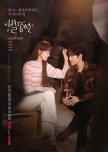
Are there any bad ideas?
"Sh**ting Stars" Writer Production MeetingProducer: "So our primary storyline is a rom-com with Lee Sung Kyung and Kim Young Dae. Seems like a winner. What else are we gonna do?"
Writer: "How about a hint of a love triangle?"
P: "Sure."
W: "And a secondary romance."
P: "Love it."
W: "I'm thinking about a third romance too."
P: "Super."
W: "In fact, I've got ideas for another romance, maybe even two."
P: "We'd only be able to give the one about thirty seconds of screentime per episode, but so what? Let's do it. The other one gets no screentime but gets mentioned occasionally. That's no problem."
W: "And an anti-fan subplot."
P: "Awesome"
W: "We could also do a parent abandonment deal."
P: "Hell yes, let's do that too."
W: "Oooh, what do you think about a suicide by a childhood best friend?"
P: "Winner."
W: "A stalker?"
P: "Sold."
W: "Seriously? All this?"
P: "Yes. Absolutely and if you come with anything else, we'll do that too."
W: "How do we transition back and forth between all this?"
P: "There's gonna be a lot of hugging."
W: "Does that make any sense?"
P: "This is K Drama baby. We don't need to always make sense."
Does this sound exhausting and chaotic? Yes and that's "Sh**ting Stars". All of these things. Five relationships. Multiple dramatic subplots. Constant tone changes. Crises. Resolutions. Confessions. Binge drinking. And on and on and on.
Despite the kitchen sink and everything else in sight being thrown in, the more frenetic and messy things get, the better. The cast does a remarkable job at entertaining with a lot of these different elements. Lee Sung Kyung and Kim Young Dae are both terrific comedians and while they may not be entirely convincing as a romantic couple, they both consistently generate genuinely funny material. Lee Sung Kyung may not have the most varied range, but when she has a character in her element that matches her strengths - extreme extroversion and borderline emotionally manic - she's a joy. Kim Young Dae is slightly more subtle, relying on a slew of facial expressions and sly dialogue delivery. When the narrative around them is merely just average, these two are good enough with basic material to elevate the show to genuinely entertaining.
Park So Jin and Lee Jung Shin might not match the two leads in acting talent, but they do generate traction as a supporting couple. And Lee Si Woo is a gem as a pampered young actress that unexpectedly falls for her acting partner.
Unfortunately, the dramatic interludes come and go so quickly that they don't pack any punch. And with all of them centering around Kim Young Dae's Tae Sung, every time one of these subplots takes over, Lee Sung Kyung's Han Byul gets pushed in to a corner with far too little to do.
Worse, the most prominent character after the two leads is Yoon Jong Hoon's Yoo Sung. It's a bland character with a flat and one-dimensional portrayal. And when a relationship develops between Yoo Sung and Kim Yoon Hye's Ho Yeong, it's all awkward and uncomfortable.
Overall, "Sh**ting Stars" has some really entertaining stretches but mixed with some dreadful sections. But the two leads and the laughs they manufacture push this over the line in to recommended territory.
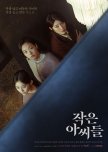
Perhaps the only significant misstep is in the title
There's scant overlap between the source material of "Little Women" and the Korean drama that bears its name. Louisa May Alcott's novel has three sisters that struggle in a family afflicted by poverty, but there's only scattered other parallels between the present drama and either the novel or previous adaptations. And perhaps the most jarring twist in an almost endless string of them is the one that hits quite early on - that this is not at all what a viewer would expect from something called "Little Women".Kim Go Eun, Nami Ji Hyun and Park Ji Hoo play the sisters In Joo, In Kyung and In Hye respectively. In Joo is a bookkeeper in a corporate office but an outcast among the staff. In Kyung is a reporter at a news station where she seems to get the worst possible assignments like covering a typhoon from the middle of the typhoon. In Hye is a prodigy at oil painting but resents that her older sisters sacrifice for her to pursue her art.
The narrative kicks off with In Joo's only friend at work nonchalantly asking her to help with a side business project she's been working on. And then bad things start happening and it's not clear who's behind them, but there's little question that the Won family and Uhm Ki Joon's Park Jae Sang who has married in to the family are involved. Before long, each of the In sisters entangles herself with this clan and it very likely will not be a healthy relationship.
Kim Hee Won directs and does so masterfully. The production value across the board is flawless. It is exceptionally well shot. The sound editing and score are sublime. The wardrobe, hair and makeup crews killed it. Each episode is a compelling watch in isolation and as the tension builds quite quickly early on, it only ratchets tighter as the series progresses.
The cast is led by some big names like Kim Go Eun and Nam Ji Hyun and Wi Ha Joon. Of those three, Nam Ji Hyun stands out, although all are very good. There's some terrific performances by supporting cast too. Gong Min Jung is a viciously combative colleague of In Kyung. Kim Mye Sook plays a distant, wealthy relative of the In sisters and is terrific. Park Bo Kyung is a frightening operative working for Park Jae Sang.
But the most captivating work is by Uhm Ji Won. Her Won Sang A is definitely not a mentally well person. Is she simply a spoiled princess of the powerful Won family? There's a lot more than that (A WHOLE LOT MORE) and while plenty of mystery surrounds the character, when she's on screen, everything else shrinks. It is hands down the best supporting performance in the genre this year.
If there are flaws, it's that the screenplay gets a little too tricksy at times to feint this way and that. Most often, things are adequately explained, but not always. And there's some inconsistencies in how much control a powerful group holds over courts and judges and prosecutors and the media. At times, it is unlimited and a moment later, they are no more powerful than a corner convenience store.
Highly recommended for the above reasons as well as what is unquestionably the cameo appearance of 2022. "Little Women" is almost certainly the best drama of 2022.
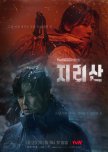
An impressive collection of talent badly underutilized by a troublesome script & production misfires
One of the recent additions to the literature genre is The Recipe Blog. It is characterized by insufferably long backstories rife with unnecessary details, long personal digressions and endless teases that it is about to get to The Big Reveal of, y’know, The Actual Recipe. [scroll scroll scroll “Where is it?!!! Aaaarghh, back to the Google search…]It is easy to imagine the producers of “Jirisan” concocting this show much like the reader of a recipe blog: imagining the beautiful final product, struggling to get through the preliminary preparations, getting to the list of ingredients, then finally running out of patience, throwing them in a bowl haphazardly, giving it a few stirs, tossing it in the oven and going to have a very large glass of whiskey. It’s not that “Jirisan” is an hopeless, ugly mess that doesn’t merit a meal, but it needed a skilled chef at the helm to blend all of the elements together in to something that comes close to approximating the sum of its exceptional parts.
And the parts, in isolation, are a murderer’s row of impressive quality.
The supporting cast is Grade AA+++: Go Min Si as the fresh, novice ranger. Oh Jung Se (OH JUNG SE!!!) as the lonely veteran ranger. Jo Han Chul, Sung Dong Il and Jun Suk Ho are all terrific character actors. The mountain is a gorgeous setting to the show and viewers are treated to some outstanding drone shots of the scenery.
Jun Ji Hyun is the star and is every bit the talented actor needed to anchor a big budget drama. It’s not an award-winning role, but Yi Kang is a a solid lead character - enough complexity and development, a dry sense of humor and the tragic backstory. She is highly guarded personally but has a good development arc as the show progresses.
The other lead is Joo Ji Hoon who stands out more as an actor and his character, Hyun Jo, is the most intriguing of all. Joo Ji Hoon is really as complete a package as there is in the industry - all the physical attributes and a wonderful actor. He is warm and outgoing and understanding of Yi Kang and also exasperatingly driven to stop the killer that has escaped capture. Every time the show puts Hyun Jo in the spotlight, the energy of the show picks up noticeably.
All these various individual qualities, unfortunately, don’t mesh into a scintillating vehicle for entertainment. The chief culprit is, ironically enough, The Culprit. The murder mystery is flat out not particularly suspenseful and “Jirisan” never works out how to generate any measurable amount of tension. A fair amount of blame goes to a script that incorporates so many multiple timelines that anyone outside of a quantum physics practitioner is likely to struggle to make sense of. It also doesn’t help that the present day storyline has both main characters incapacitated to a certain degree and, as a result, incapable of interacting with each other. The show also starts out on a bizarre and awful sequence involving a rescue amidst a embarrassingly badly rendered cgi rockfall. The OST promoted a solo BTSer effort but it is wholly forgettable. And there’s little things like frequent splatters of blood that don’t look anything like actual human blood.
At no point (other than the opening sequence) is “Jirisan” tedious or unpleasant. But this production desperately direction and editing that made it’s little multiverse more accessible and the interaction between the cast members more meaningful and resonant. As it falls short on those areas, it’s very much a middle ground of a show - with some fine actors and a couple of intriguing main characters that are very much in search of a better blend between them.
Is it recommended? Kind of. Maybe? Not really or at least not strongly at all.
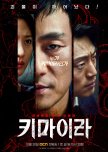
Terrific plot paired with an almost total absence of charismatic characters
Robots are perfectly fine. They do lots of cool things. They can vacuum. They help build cars and other stuff. Some robots are even helping with medical procedures. This is all good stuff. There’s lots of robots on screen too from the droids in the “Star Wars” universe (mostly entertaining) to the invaders from outer space in Michael Bay’s “Transformers” franchise (less positive things to say about them) and the robots that look human like “The Terminator” or Data from “Star Trek: The Next Generation). [reviewer’s note: apologies for the list of references to Western fare]Robots can be a contributing element for an entertainment production. When they are, it’s because they are usually imbued with human-like personalities. Sadly, the reverse works less effectively. Human characters meant to be more robotic in their personality rarely seem to engage viewers. This may seem like an odd introduction to a drama set in modern day South Korea with no sci-fi or fantasy or supernatural element but rather named after and with running references to Greek mythology. Before this all connects, a digression:
“Chimera” is a drama focused on a serial killer that uses incendiary traps to kill. A spree thirty-five years prior to the current timeline ended when a suspect was apprehended and committed suicide in police custody. A new string of deaths is now following the same patterns. That’s the show.
To its credit, this setup is surprisingly good. There is more than a bit of chemistry and science and it is presented in a way that the average onlooker can make sense of. It’s a different approach to creating a serial killer character. It also helps to physically separate the killer from the crimes so the entire scene can be captured without revealing the identity of the chimera killer too early. As characters become suspicious and then are discovered to be not bad guys or at least not The Bad Guy, the narrative nicely keeps springing action scenes and surprises at a regular clip. Had an equally accomplished cast of characters been participating in such a narrative, it would have been a terrific show.
There is one. Kim Su Hyun’s Eugene Hathaway, an FBI profiler that’s been shipped overseas, would have been the ideal character to lead “Chimera” and build the show around. She’s intellectual but also empathic. She excels in a high pressure environment. And Kim Su Hyun shows why she’s appeared in two of the biggest cinematic franchises on the planet (the MCU and Harry Potter).
But the show is instead built around Park Hae Soo’s Jae Hwan, a detective that is a maddeningly inconsistent character. At times, he is utterly befuddled at the worst possible time and finds the absolute worst thing to do. Other times, he is Mr. Cop Cliche: bristling with superiors when told what to do, playing the bad cop type in an interrogation and convinced that his half-baked hunch is all he needs to take down his target. Park Hae Soo does what he can, but with all the focus on him, it’s an impossible character to salvage.
The rest of the crew is where the robots come in:
The doctor - calculating
The special investigative team leader - grim
The lawyer - quiet
The police vet - subdued
The mother - withdrawn
The CEO - restrained
The CEO’s wife - buttoned up
The CEO’s wife’s brother - resolute
The closed circuit tv police officer - shy
The other police officers - so much the typical police character that they could be faceless
That’s the theme. One robotic character after another appears on screen and when they show up, they tend to be there for extended appearances. Granted, not every fictional character needs to be some wild carnival barking exuberant rainbow of personality, but the calculus should not be to take three monotones, put them on couches and let them mumble to each other for a good chunk of an episode. The collective ends up being a group that’s difficult to connect with so when cast members start getting picked off, it’s a shrug and an “oh well” and let’s move on.
It helps less that Woo Hyun appears with regularity in “Chimera”. Somehow this gentleman who, in person, might be the kindest and most charitable man in the hemisphere regularly gets work despite the fact that he is one of the top five most graceless actors in the industry and the only one of the five that didn’t get the work because his day job is as a successful idol.
Layer in some lame explosion special effects, conventional camera work, no interesting OST to speak of and a regular pattern of alternating stronger episodes with slower episodes and the production as a whole simply never gains more than a modicum of traction.
In a better vehicle, Park Hae Soo and Kim Su Hyun could be a phenomenal pair of actors. “Chimera” is not that show. Not recommended.
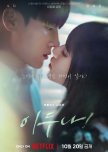
Like the title character at the beginning, it doesn't know what it should be
"I can't sing" says Doona when asked why she stopped performing but it's obvious that the issue is NOT that she can't sing. It's that she doesn't know WHY she is singing. And that after the years of training and performing, she's lost any meaning to what had once been her dream.That much is clear.
And equally clear is that a kpop idol interacting with Yang Se Jong's Won Joon is like a plunge in to an ice bath. He's such an opposite of her. He's beyond his years in maturity. He doesn't smoke. He's a rule follower. His emotions are as grounded as a concrete block building foundation. C'mon, he's a civil engineer. As a romance? Legitimately, there are some terrific, compelling scenes between Won Joon and Doona. But this is not a show where any rational viewer is expecting a fairy tale - they get together, leave the world behind and live happily ever after. Immediately upon solidifying their relationship, the clock begins audibly ticking before their troubles as a couple will consume them. Regardless of whether or not the lovebirds find a way to be together, the main issue that is dramatized is whether Doona falls for Won Joon because she needs someone and he's the one that happens to be there or is he legitimately her soulmate? But somewhat ignored is why has Won Joon fallen for Doona as a person? Clearly he's a straight male and she's stunning and seems interested in him and that should obviously be enough for a brief infatuation. It's not enough, however, to explain how he overlooks all the negatives (and there are many) in her and she becomes the only woman for him. So the romance is intermittently great but, in totality, is more just going where it was pretty expected it was headed from before the first frame hit the screen.
Moreover, the secondary storylines have promise. Park Se Wan and Kim Do Wan are a fantastic pair. Won Joon's got a potentially colorful hometown connections subplot. Ha Young's Jin Joo has a troubled family life. But the shorter episode run times and 9 episode duration don't give these diversions ample space to really fulfill what could have been. Park Se Wan, in particular, is wild and colorful but shows up halfway just as things in the main plot are gaining serious traction. Even just a single additional episode could have allowed more screen time to cultivate what were some potentially entertaining developments.
Where "Doona" really hits (and, in a way, misses) is that Doona herself is this fascinating, complex, damaged and brilliant character in the midst of discovering herself and her passion for music. And, for as much as no other man but Won Joon can make her happy, the reality is that not even he can come between her and who she is as an artist and a singer. It's her journey from being a woman in crisis to finding what within her gives her a purpose and meaning that captivates. How it misses is that it is clumsily obfuscated by the demands of the industry that she return to settle her contractual obligations and the effect that her return to singing has on Won Joon. These are certainly points worth noting in her growth, but they overwhelm what could have been a better exploration of her personal awakening, finding meaning in songwriting, realizing what she loved about performing and that a life without music, for her, would be a life without meaning. Instead, her internal development is captured in only brief moments. It's a pity.
Recommended but with forewarning that "Doona" isn't what it could be.
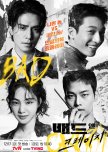
Terrific scenario spoiled by slipshod storytelling, a problematic protagonist & uneven cast
This should have been an easy slam dunk hit. Lee Dong Wook as a corrupt investigator with a redemption arc, Wi Ha Joon as a looney vigilante and Han Ji Eun as a narcotics detective is a great setup. Layer on the relationship between Soo Yeol and K is all in Soo Yeol's head and there's endless potential for entertainment.It's potential mostly unrealized unfortunately.
It begins with another corrupt cop as the primary villain. He's all but twirling a handlebar mustache and exclaiming "You'll never catch me! HAHAHA!!!" Sure enough, the initial attempt to bring him to justice fails and he continues his nefarious deeds. But in relatively quick order, he is brought down only to be replaced by a corrupt politician who repeats the mustache twirling, threats of being above the law, failed initial attempts to bring him down and then somewhat surprisingly quick reversal where his malfeasance is brought to an abrupt end. After that, it's another corrupt cop. Or it might be the drug gang enforcer. Or the wild-eyed assassin that works for one of or both of those two. It's difficult to piece together how quickly the show burns through the lineup of villains each of which momentarily appears to The Big Bad only to be sidelined almost as quickly as he had appeared.
Then there's a mind-controlling REAL Big Bad that takes an agonizingly long time to be revealed by which time there's not a lot of time to build to a satisfying climax. It's a frenetic series of arcs through the first half of "Bad & Crazy" that is then swapped for a tedious one.
If the dialogue and character development had perhaps been better fleshed out, perhaps the wonkiness of the plot might have been worth overlooking, but it isn't.
Lee Dong Wook's Soo Yeol flip flops back and forth between spastically fighting with K to pathetically groveling for mercy to scheming for a promotion during all of which the volume is set to 10. It's a disappointing approach as Lee Dong Wook is a masterful thespian at a more dialed down level. But honestly, with the tediously generic and repetitive dialogue ("You crazy psycho!" "You crazy jerk" "You crazy punk" "You psycho"), Soo Yeol was a mess of a character to portray.
Wi Ha Joon was vastly more entertaining as the wildly grinning and mischievous K. Had he been as prominently featured as Soo Yeol, particularly after the first few episodes, this review would likely have been significantly more positive. Alas, Wi Ha Joon is a distant second in screen time.
As for the remaining cast, there's a cornucopia of less than stellar castings (Lee Hwa Ryong), generic characters (Sung Ji Ru, Shin Joo Hwan, Jo Dong In) or promising appearances that turn out to be limited (Park Se Joon, Lee Seo An, Kim Si Ha). On a brighter note, some of the legion of Briefly Appearing as the Big Bad characters (Lee Sang Hon, Won Hyun Joon and espeically Im Ki Hong) are terrifically fun. And Kang Ae Shim and Kim Dae Gon alternate between delivering the most emotional and most comical scenes.
Overall, though, the production fails to realize what could have been and labors to build sustainable intrigue. Not recommended.
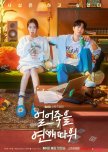
Love is not for suckers. Not when it's done well. Which this is not.
A reality show within a scripted show is a potential goldmine of craziness, scandalous behavior, unexpected betrayals, unlikely alliances and revealing both physical parts and intangible sides to the cast. And “Love is for Suckers” when it peels itself away from the generic main-character-romance drama, acquits itself rather well. “Rather” though is an important qualification because there’s some frustratingly obvious ways that this production could have been a memorable one.The main issue is how the storyline and tone are balanced. It’s very much a show centered on the two main characters - Lee Da Hee’s reality show producer Yu Reum and Choi Si Won’s neurologist/reality show participant Jae Hoon. They’re best friends and neighbors that, of course, have the occasional surfacing of romantic tension that’s been blocked by Jae Hoon’s all-encompassing job and Yu Reum’s previous serious relationships.
They end up on opposite sides of the camera in a reality dating show with Jae Hoon expected to romance one of the female cast members and Yu Reum expected to make compelling reality television. That both of these don’t sync up with a potential girlfriend-boyfriend relationship between the two main characters is the primary narrative. It’s not altogether unentertaining but how it unfolds ultimately is unfulfilling.
Chief among them is that Choi Si Won is a natural at light and comic and boisterous, but is out of his depth with a more serious role. And there’s a good stretch focused on the character’s tortured past that he hasn’t moved past and it’s not a convincing portrayal.
It’s also a hard sell that Yu Reum is a diligent worker, an ally to her colleagues, stands up and takes responsibility when she makes a mistake, is honest and kind, a respectful daughter, fearless in the face of danger, able to eat spicy food, etc. but is somehow struggling at both work and her personal life. Together, the two are just not a lot of fun, don’t really seem to match each other at all and neither is sympathetic enough that the melodrama lands emotionally.
Meanwhile, there’s some tremendous characters beyond the main two. Jo Soo Hyang is electric as Yu Reum’s superior Kang Chae Ri. She’s a modern, unapologetic, strong female that is flawed and damaged and reckless that is both maddening and endearing. Park Yeon Woo also hits all the right notes as an insecure celebrity chef. Lee Juyeon’s Han Ji Yun is a more one dimensional character as the art professor pining for Jae Hoon’s attention, but it’s a warm and touching performance. As is the married and co-restauranteurs couple played by Min Jin Woong and Noh Susanna hoping to conceive. But each part of this ensemble gets short screentime so that Jae Hoon can break out a head-tilted pouty face at an unendingly despondent Yu Reum about a dozen times per episode. Had the whole thing been reengineered to spread the spotlight around more and tilt the main pair’s romance to a lighter, more comedic style, perhaps that would have really pulled in an audience.
Other minor complaints - Lee Dae Hwi’s Sang Woo is a bland character that rarely is necessary to advance any narrative, whether primary or secondary, forward and the performance is uncomfortably stilted. There’s a smattering of subplots between the reality show cast members and some of them are well-acted and show promise, but as soon as one episode sets up a potentially compelling direction, it will be forgotten and ignored thereafter. An eating disorder? Appears and vanishes. A mental illness? Forgotten once it triggers a laughably poor cliffhanger at the end of an episode.
And a minor detail, but impossible to miss - Lee Da Hee was styled and wardrobed to near perfection in her most notable recent work “Search: WWW” and the contrast with how poorly she is outfitted on this show is gargantuan.
“Love is for Suckers” has some nice pieces but they don’t fit together very well. Not really recommended.

Could have used a change in direction
Newtonian physics may not bind the Laws of Drama Writing, but it is a helpful starting point for examining “Bulgasal: Immortal Souls”. Newton’s first law states that a body that is at rest or is in motion at a constant speed in a straight line will remain at rest or continue at the constant speed in a straight line unless it is acted upon by a force. In other words, for something to change, we need some sort of object or mechanism to trigger a chance in action.With the drama in question, we begin with events that occurred 600 years ago which is where we find our object moving forward. To summarize, Goryeo era monster hunting ace Dan Hwal became a bulgasal (an immortal monster which feeds on human blood) and he loses his family. He sets out to wreak revenge against those who put him in his predicament. We flash forward to present with Hwal seeking Sang Un, once a bulgasal, now a human, reincarnated. Every other character of any note is a reincarnation of someone or something other creature from hundreds of years ago. As the storyline progresses, Hwal and Sang Un encounter Ok Eul Tae, an antagonist from the origins of the story.
Let’s set the storyline aside for other matters…
The production is outstanding. Whether it was set design, photography, soundtrack or the physical monsters themselves, this crew was tops. The monsters are exceptional. Whether the settings are the Goryeo era forests or present day mountains, the settings are gorgeous. The special effects are above average. There is not a copious amount of OST but the few entries are solid. And there’s more than one underwater sequence that are some of the highlight scenes.
There’s some fine acting too. Park Myung Shin is the standout as a Goryeo era shaman and present day aunt/butcher for Hwal. Lee Joon creates a compelling and vibrant character for the twisted and scheming Eul Tae. Han Seo Jin plays a young Sang Un and continues to create one of the most impressive filmographies of any young actor anywhere.
It’s a mixed bag for the leads. Lee Jin Wook as Dan Hwal has the imposing stature and gravelly voice to pull off a character that is part dark monster and part former human bent on retaining some of his humanity. But the character has shortcomings that no actor could really work around. He’s smart enough to clandestinely coordinate a complex manhunt and amass a significant collection of assets but has lived hundreds of years learning almost nothing. He follows a predictable cycle where he is introduced to a new side to his backstory, he refuses to believe it then just decides that it must be true. And despite the fact that he wants to end his troubles, he’s got the worst sense of self-awareness on the planet. He’s supposed to be the hero, albeit a non-traditional type of one, but he’s so determined to derail any effort to make progress that he’s nearly impossible to sympathize with.
As for Kwon Na Ra’s Sang Un, she’s got enough sense to diagnose Hwal’s issues, can formulate a basic plan and know that she needs to invest in and maintain relationships. That’s all good but the direction for the character was to overwhelm everything else about the character with a damsel-in-distress aesthetic. Even when her actions should signal strength and determination, the visuals instead emphasize her weakness and impending panic. That’s the present day visuals. Have to recognize that her appearance in the historical eras is simply stunning.
Without spoiling too much, there’s no end to this saga unless there’s an end to Eul Tae or Hwal or Sang Un. But two aren’t easy to kill and the other one will just reincarnate so something out of the ordinary has to happen to end this.
Here’s where Newton comes in. We have this trio that has been on the same path for six hundred years with this seemingly unsolvable problem. What would have made for an outstanding drama is that at some point of the storyline, the viewers are given some somewhat comprehensive understanding of how our object in motion at a constant rate of speed in a straight line was put in said motion at said constant rate of speed in said straight line. Then the production could have adequately built up over multiple episodes to a climax where new big force is brought forward to bring about the cataclysmic change in motion and to put an end (or new beginning) to our heroes and villains story.
Instead, a full reveal of the real origin story only happens far, far, FAR! too late leaving little time to build any appropriate amount of tension for the climactic showdown. Pending the full reveal, Eul Tae is left as a likely evildoer but possibly ambiguous character which fatally hamstrings his actions. Instead of going full dark and crazy, there’s only glimpses of his true nature. To keep a semblance of mystery about him going, he winds up a disappointing antagonist who spends too much time politicking with Hwal and plotting in the background than being, y’know, a bloodthirsty and invincible monster. And instead of Hwal and Sang Un spending far too much time wondering how they ended up this way, they could have been doing something much more interesting like, y’know, fighting monsters.
It’s a tremendous shame because the scenario was promising. There’s lots of interesting monsters and the show was terrifically entertaining when there was action. But it is invested so heavily in a painfully slow reveal of backstory and keeping the main characters and viewers in the dark that the characters are unable to develop. And, y’know, move forward in a new direction.
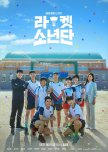
An incredibly fun show
"Racket Boys" is not merely the best show about badminton (if there are many others) and not merely the best drama with a sports background, but it's possibly the best drama about friendship. It's almost a total package from cast, story, production value, score, photography and everything else.There are a few faults. For some reason, Kim Kang Hoon's Yong Tae gets an inordinate amount of screen time to the detriment of Son Sang Yeon's Yoon Dam, Choi Hyun Wook's Woo Chan and Kim Min Ki's In Sol. The coaching couple of Kim Sang Kyung and Oh Na Ra overplay their parts (the former as a goofball and the latter as humorless and grim). The older villager subplots show early promise, but as their focus shifts away from Jung Min Sung and Park Hyo Joo's former city couple, the emotional punch fades. Moreover, it perfectly acceptable to have a show without Woo Hyun. Seriously.
But the flaws are minor. Tang Jun Sang is marvelous and his performance is so different but just as compelling as his work in "Move to Heaven". Hopefully, he continues to grow and find opportunities in productions of this quality. Although in a smaller role, Lee Ji Won sparkles as the sidekick to the star athlete. Her work in episode 14 and that episode as a whole is one of the best episodes of the year. The direction and story deftly mixes humor and tension. Even the badminton pieces, though repetitive, are compelling viewing throughout.
2021 is more than half over and it seems unlikely that any show will rival "Vincenzo" for top marks for this year, but "Racket Boys" is the leader in the clubhouse of the remaining challengers and should be on the list for top dramas of the current era.
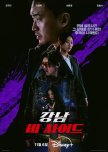
Less of a traditional drama and more like an acting laboratory
For anyone that has not watched "Gangnam B-Side", enter the experience with the expectation that it is not traditional drama fare. Because of the characteristics that typically are associated with a drama, it is remarkably bereft of any of them.Do not watch expecting some coherent story arc with humanlike characters with somewhat meaningfully fleshed out personalities and dialogue that contains the occasional complete sentence. This vehicle seems more interested in taking actors and asking them to do things to see if they work or not. Some of the things that the production team seemed interested in testing are:
Does anyone know who Jo Woo Jin is without having to look up his biography on MDL?
Would anyone believe it if the pre-release marketing said that Ji Chang Wook was cast as a true villain? Like not a bad guy that is still likable and sort of a good guy inside and immeasurably cool?
As a plot device, does it make sense to disappear the most compelling character from virtually the start to the end?
Might someone/anyone in the Eastern Hemisphere have a different take on how to portray a dirty cop or corrupt prosecutor?
Is there a noticeable difference in Bibi's approach to playing a drug lord's daughter/protege' and a street-wise call girl?
Can Ha Yoon Kyung sell a no-nonsense morally ambiguous prosecutor character after about a dozen consecutive roles as the painfully cute, syrupy sweet secondary love interest?
If Bibi and Oh Ye Ju's characters are put in almost identical predicaments, is there any entertainment value for the second time through the same subplot?
With respect, it's possible for some dedicated viewers or family members of Jo Woo Jin that the answer to the first query is "Yes" but otherwise, none of these emerge from the mess that is this production positively. Jo Woo Jin is not lead material. Ji Chang Wook is a bad guy, but not the villain. Bibi's Jae Hui is the most compelling character but is either missing or kidnapped or otherwise not around for almost the entire show. The bad cops and sleazy prosecutors are the same as any other drama. Bibi is great as this type of character but it's indistinguishable from her character in "Worst of Evil". Ha Yoon Kyung scores brownie points for trying, but she does not deliver the weight and intensity that this role needed. And this plot badly needed to go in a different direction for the second half.
Which is not to say that everything is bad here. Jung Ga Ram is surprisingly adept in his hyperbolic, bad boy night club denizen. Great? No, but much improved over the wooden, shallow type from his previous work. It's yet to be seen how much range Bibi has as an actor, but she has the desperate, lawbreaking, not-to-be-trifled-with, buttkicking maneater character SO DOWN. Jung Man Shik can play shady, slimy & icky like very few others can. And nobody shines as much as Ok Ja Yeon as a sort of den mother to the party girls (a better version of this production would have elevated this character to one of the leads with a full backstory).
The show has lots of blinking lights and bells and whistles. There's more collapsible batons than anywhere outside of the collapsible baton factory. And the martial arts coordinator has one of the few credits I've seen for that job on MDL so there's that little nugget.
And it's definitely got a lot of grit. There is no romance here. This is not a fairytale about nice people or nice places. With a capable group to write some actual dialogue instead of recycling profanity and generic threats of violence, choreograph a fight scene with a scintilla of connection to reality and just one character that an audience could hope emerges from all the trauma in one piece physically and emotionally, "Gangnam B-Side" could have been a taut, compelling thriller.
Even for ardent fans of Ji Chang Wook or any of the other actors, can not recommend.

A most unexpectedly sweet gem
Not every day needs a 120 mph roller coaster or surfing thirty foot waves or dining at a 5 star Michelin restaurant or sporting the latest haute couture fashion. Somedays, a casual walk in a familiar neighborhood in sweatpants and a hoodie followed by a simple grilled cheese sandwich is just as enjoyable. At that’s the vibe of “Once Upon a Small Town” - a leisurely, pleasant sojourn on a warm day.No one will find anything remotely novel in the setup - a city denizen gets shipped somewhat against his will to a rural enclave. He initially recoils at everything unfamiliar but is won over not only by the community but also by a potential love interest.
And no one will discover any new angles on the romantic entanglements involving childhood relationships, ex-significant others, easily avoided misunderstandings, awkward confessions, friendzones and the like.
Nor will the vast majority of the supporting cast of rural inhabitants break any of the stereotypes from other slice of dramas.
In fact, mere minutes into the first episode of “Once Upon a Small Town”, the direction, destination, velocity and signposts on the journey are all readily apparent. But somehow that doesn’t diminish the ride. A short run of twelve episodes and runtimes of 30-40 minutes per episode deserve a decent amount of credit for keeping things moving without getting bogged down in secondary storylines and extended montages and endless rehashing of backstories. But there’s more to it. Director Kwon Seok Jang manages the pace of the storyline well, mixes in just enough interaction with supporting characters and doesn't let anything fog up the focus on the romance.
Choo Young Woo has a fairly light resume but he's got the basic attributes for carrying a lead role. The character of Dr. Han isn't particularly demanding - look pretty, feel awkward in uncomfortable surroundings and otherwise let everyone else around ham things up. And for this, Choo Young Woo hits all the marks (easy targets though they may be).
Meanwhile, Joy may find herself in as much demand as an actor as she has been as a singer. The Red Velvet singer has had two strong performances this year (the first as one of the very few bright spots in an otherwise rather dismal "The One and Only") and now to even greater effect here. A police officer would not be the instinctual direction for an ideal character for Joy, but this isn't a hardnosed violent crime detective. She's more everyone's little sister on the personal side and professional household problem solver. It may be a case of an actor and a role simply almost perfectly suited for each other, but as the show progresses and Ja Young becomes a more complex character, it seems less and less that "it's just Joy being herself" is what's happening here. Regardless, she's ebullient and extroverted and a delight at nearly every turn.
Props also to the sound editors who spare no opportunity to add all the buzzing insect noises in their inventory. Helps remind those viewers that might pull up stakes and head for the countryside in search of a dashing vet or comely policy officer that there are also less welcome inhabitants there too.
Recommended.
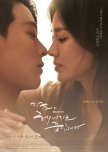
D.O.A.
The flaws of “Now We Are Breaking Up” are so numerous and comprehensive that evaluating it feels more like issuing an autopsy report than a typical review. In the event any reader requires a synopsis, a successful fashion photographer (Jang Ki Yong’s Jae Guk) and a clothing designer (Song Hye Kyo’s Young Eun) romance each other while attempting to overcome the many obstacles that seek to disrupt their relationship. There’s more but it’s not necessary to delve into beyond that one sentence.If the production early on seemed to have one viable strength, it was the pairing of Kim Joo Heon’s PR firm CEO Do Hoon and Choi Hee Seo’s mercurial Chi Sook. That they were the most colorful personalities on this drama should be considered a scientifically proven fact. That they would wind up as the secondary romantic couple was obvious from early on. That the entertainment value would noticeably increase each time they were together on screen (for a while) was plain. And then once they were together, Do Hoon insisted that Chi Sook drink tea instead of wine. He declined any physical contact. He basically seemed bent on discontinuing anything she did for fun. The actors shouldn’t carry the blame here as both from the drop portrayed the characters as vibrant and warm. The writing, sadly, for this subplot was determined to take this drama’s most engaging characters and bleach them with a concentrated boredom solution.
Although it was never a prominent arc, one of the welcome diversions through the first half of its run was the antagonistic but flirty banter between Oh He Sun’s layabout rich boy Chi Hyung and Yura’s no-nonsense Hye Rin. The opposites attract relationship trope is popular because it’s like the equivalent of a layup in basketball - anyone with any basic skill can accomplish it. But after regular, albeit intermittent, screen time after Chi Hyung’s introduction for the next few episodes, this narrative essentially vanishes.
That’s not all the subplots though. Several episodes in, Young Eun’s father retires from his school principal position which then launches her mother’s seemingly long-planned scheme to pursue divorce and independence. It would seem that she long held a grudge for being left managing the household and felt unappreciated. How this manifested were scenes where the father would discover that daily tasks around the house were more difficult that he imagined, became angry, demanded help from the mother who would then mock his inability and refuse to help him. The entire storyline was unnecessary and meant less time for what might have been (hypothetically) more compelling viewing. It was made worse by repeating in near verbatim form the scene with one household activity after another - breakfast, cleaning, laundry, etc.
And there’s still another secondary storyline. Park Hyo Joo’s Mi Suk had been a runway model but her glory days are long behind her. Her husband is hitting on a younger woman at work. Her two best friends are living the glamorous single life. Her mother-in-law is a monster. And then she gets a terminal cancer diagnosis. What follows is one of the few times that “Now We Are Breaking Up” manages to connect a measurable sequence with consistent emotional resonance. She faces the grim diagnosis head on. She strengthens her friendships with Young Eun and Chi Sook. She shines as Jae Guk photographs her. And she makes an out-of-retirement victory lap appearance as a model. Had the storyline ended here, this would have been a solitary bright spot but instead, her character elects to befriend the husband’s admirer and recruit her as her replacement and it’s given an almost matter-of-fact treatment as if a terminally ill woman would ordinarily dismiss the anger and feelings of betrayal to reach out to her husband’s mistress with friendly gestures. It’s such an exotically bizarre turn to take that even the would-be-mistress is flummoxed by the sequence. But does any party take notice of the obvious madly waving red flag? Nope.
As for the primary arc of the romance between Young Eun and Jae Guk, it earns a place on the podium of most bland and passionless couples to see the screen in recent memory. Jae Guk is primarily a one dimensional character except for the rare scene where he is actively working as a photographer. His conversations with friends, family and, in particular, with Young Eun are a cycle of lifeless expressions, monotone delivery and rehashed subject matter. The central conflict propped up against our romance is that Jae Guk’s older brother, now deceased, had a relationship with Young Eun while engaged to another woman. It is somewhat of a provincial, old-fashioned conflict which doesn’t translate particularly well to an audience that isn’t always steeped in longstanding Korean cultural norms. Still, even if it was a compelling dilemma for Jae Guk, the exposition of it by interactions with his adoptive mother (Cha Hwa Yeon’s wealthy socialite Hye Ok) and his brother’s ex-fiancee (Yoon Jung Hee’s department store exec Yoo Jung) should be filled with unrestrained emotional outbursts of anger, resentment, jealousy, blame and grief. Instead, it’s three characters, each of them in an endlessly mechanical and mundane manner, sleepwalking through generic dialogue.
Relatively more positive thanks to a steady diet of work crises, Young Eun has some depth as a character, both individually and in her relationships with her friends, family and colleagues. The portrayal of Young Eun, disappointingly, is irrefutably bad. Song Hye Kyoo did not earn her A List Status by accident. She has a long and accomplished resume’. And she may not be a naturally dynamic actor, but her performance here is unrecognizable against her previous work. Whether Song Hye Kyo was following an editorial decision for Young Eun to be an expressionless automaton or she was left to her own devices to interpret the character in such a manner, it is a colossal bomb. The character has many admirable qualities - perseverance with her work and loyalty for her friends among others - but none of them connect to a viewer through Song Hye Kyo’s wooden performance. What would be a compelling drama (or documentary) is one that follows how Song Hye Kyo terminates her current representation and finds a new agency that can keep her away from an insufferable dud like this going forward.
“Now We Are Breaking Up” is a bad show; a really, really bad show with a long list of unnecessary subplots and superfluous characters, a bleak desert in place of a primary narrative and scant redeeming qualities of any kind to speak of. Anyone that was central to its creation should be considered potentially contagious with lousy judgment and possible cosmic-level curses and avoided at the longest distances possible.
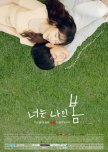
Novel formula boosted by some flawless contributions
"You Are My Spring" attempts to combine a rather grim murder mystery with a lighter romantic drama and it in large succeeds, though it is more due to how well some of the foundational components are executed than due to the freshness of the concept.First, the photography is stunning. The composition of the shots and the editing in this production are as good as any video since "Parasite". It's that good.
Second, the cast as an ensemble is without a weakness. From Seo Hyun Jin to the major supporting actors (Kim Ye Won, Kim Seo Kyung and Baek Hyun Joo are especially strong), to the brief appearances, there is not a single below the bar performance. But special commendation must go to Kim Dong Wook who simply astonishes as Joo Young Do. It is almost certainly the finest acting performance of 2021 and should be a case study in how to use subtlety and silence in creating a compelling character
And the writing is excellent as well. All of the main characters are complex and original and genuine. The dialogue is smart. There's very little of the standard cliches and when one big one appears, it's done so well that it can be forgiven. Particularly well done is the character of Ahn Ga Young played by Nam Gyu Ri. What at first appears to be a stock self-centered celebrity type is surprisingly comical and sympathetic and bright.
It's not without shortcomings. The dual storyline concept works well when the main duo are closely intertwined in the plot with Yoon Park and the police detectives. But as the romance drama coalesces, the crime drama dissipates and when it inevitably reappaers in the later episodes, it blends in awkwardly and the storyline gets incomplete closure so that a late blooming side couple can have a share of the spotlight. There's also a minor subplot that appears regularly before vanishing and leaving the involved cast members either relegated to props or eliminated altogether.
Any criticism of "You Are My Spring" for trying to do too much with two very differently toned storylines is legitimate. The show cannot keep the threads wound tightly together for the full sixteen episodes. However, the stretch of "You Are My Spring" from episode seven through thirteen is wonderful. This drama should be on any list of the finest productions of 2021 and most strongly recommended.
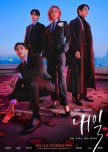
Not exactly poetic
Imagine Robert Frost traveling along a path in the woods and finding a fork. On the right, the more beaten path. On the left, the proverbial “one less traveled by”. He chooses left and moves forward. But after a bit, reconsiders and returns to the fork. Then chooses the right and, again, proceeds further into the woods. Unhappy with his choice, he returns to the divergence and resumes his stroll on the left. But he is no happier on the left than he was on the right and retreats again, this time with certainty to take the path on the right. After multiple repetitions, he wanders aimlessly in a circle at the fork, traveling in no particular direction at all for any length of time. Not a particularly compelling poem had his most famous work followed this trajectory.But this is a pretty fair metaphor for “Tomorrow”.
Like an aimless wander through some woods, it might not go anywhere meaningful but that’s not to say that it’s entirely unpleasant. There’s some marvelous casting. In his previous work, Rowoon has demonstrated a relaxed and natural vibe and he’s got a pretty full toolbox of skills to capably lead any tentpole drama. Kim Hee Sun is a terrific match for the role of Goo Ryun. Kim Hae Sook is a welcome sight in any production.
The concept is a refreshing mix of grim reaper and the Hollywood blockbuster “Men in Black”. Rowoon’s Joon Woong, through an unlikely chain of events, finds himself working as a not-yet-dead grim reaper assigned to the Crisis Management Team, a special unit that is tasked with helping souls on the brink of suicide. It’s very dark and heavy stuff, but the production manages to find some lightness and humor. Joon Woong’s childlike, adventurous personality aids the entertainment quotient enormously. There’s lots of Barry Sonnenfeld-style touches too like Kim Chil Doo’s multiple mute appearances. And the production value matches the need for outlandish hair and wardrobe, otherworldly sets and occasional specific effects.
The photography and OST aren’t award-winning but neither do they detract.
And where “Tomorrow” takes an approach as a procedural show, it has some exquisitely outstanding episodes. Several of the episodes in the first half of the series (which has a more procedural bent) are powerfully emotional. The characters and guest acting performances by the targets of the Crisis Management Team are wonderful. Rowoon’s interactions with these characters show off his acting strengths.
But this production can’t stay committed to this path. It’s got a serial narrative underneath and eventually the procedural approach dissolves and things go backward. Or south. Maybe down? It’s not clear.
Among the most problematic elements are some very awkwardly introduced backstories. There’s also too many of them as Kim Hee Sun’s Goo Ryun, Lee Soo Hyuk’s Joong Gil and Yun Ji On’s Ryung Goo characters all get period piece backstories. But none work well. Goo Ryun’s is in fragments that don’t fit together. Joong Gil’s seems to be threaded with Goo Ryun but it’s so haphazardly edited in to the present day storyline that it becomes an unwelcome distraction. The worst, however, is Ryung Goo’s episode-long slog well past the halfway mark. Had it been shorter and earlier, it’s conceivable it could have contributed. But Ryung Goo’s character is not exactly a breath of cool, crisp mountain air to begin with and spending an entire hour in a historical era where everything goes badly and then even more badly and then just goes downhill at an accelerated pace is simply unpleasant. Even had there been an overwhelming positive outcome in the present day, it’s not enough to balance out the misery of the backstory.
As for the present day, Joong Gil is a mess all-around. The character is dull. Lee Soo Hyuk’s portrayal is unwaveringly one-note which is an expression of no expression at all.
Kim Hae Sook has some lovely moments early on in the series, but as the episodes progress, she appears less and less frequently.
Rowoon’s Joon Woong is a solid character and has a perfectly good setup where his adventures put his mother and younger sister into a precarious predicament. Like with so much else though, after a promising start, the focus wanders away in other directions.
Most problematic is that the main characters, whether it’s just Joon Woong and Goo Ryun, or if the main characters also include Joong Gil and Ryung Goo, they simply don’t fit well. Chemistry is an overused term as professional actors worth their salary should be able to fool an audience that they genuinely have feelings for each other. But a lack of chemistry is precisely the most apt description of what ails these group. The characters just don't fit together and, frankly, "Tomorrow" doesn't seem to care that they are only somewhat interesting characters separately and wholly unconvincing as a team. Although some blame might fall on the actors or casting, more of it should be borne by the writing which introduces too many sideplots and the directing which invests heavily in creating a modern, quirky and fantasy setting and then jettisoning it to play it safe with worn-out themes.
“Tomorrow” has enough bright spots to recommend it but expectations should be tempered.
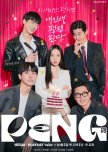
The four horsemen of the borepocalypse
It’s not that “Peng” is short in how many episodes it has or that each of the episodes is short in duration, it’s that “Peng” is short on content of any kind.Yoon So Hee plays the main character, Go Sa Ri, a divorced thirty year old woman. That she is divorced is her most defining element of her character. Otherwise, Sa Ri could float in or out or around in almost any drama as “Pretty young woman who is otherwise nondescript”. That she has apparently no social life one day and becomes the object of desire for four men the next day is supposed to be credible. It’s not but in the big picture of “Peng”, Yoon So Hee as an actress and Go Sa Ri as a character are not especially troubling. Sure, Yoon So Hee struggles with the occasional emotion-laden scene. And Go Sa Ri as a character engages in self-pity a bit too much. She's young and attractive and and smart and lives in an apartment and there's just not much more to her. But the actor and character are not wholly unpalatable and, if she were in the context of a more engaging ensemble, she would be a pleasant part of it.
What is so unpleasant about “Peng” is that the four male pursuers, played by Choi Won Myung, Joo Woo Jae, Lee Seung Il and Kim Hyun Jin, are all endlessly uninteresting and bland and interchangeably uninteresting and bland. The four actors have separate characters in theory but it would require detailed note taking to keep track of which one is on screen and how he is distinguishable from the other three. One of them is a not believable young, reclusive CEO. One is an only slightly more believable rich brat. One is a student or at least appears to be the age of a student and goes to clubs. If it were possible to not be believable in such a role, the actor playing this character would manage it. Which actor? Sorry, they all appear to be the same height and build and dress alike and have similar hair except for the one that mercifully has glasses. He’s the super not unique character of a cafe owner who moonlights as an artist. Watching these four all act together is like having only a salad for lunch. A salad that is entirely made of iceberg lettuce. Scratch that. Make it iceberg lettuce that has been left sitting out for a day so it’s not even crisp anymore. It’s just sad, wilted, soggy, room temperature leaves. A salad that is without any dressing. A sad, wilted iceberg lettuce dressing-less salad that has a bowl of plain, cold oatmeal as a side. And then eating that same meal again for dinner. That’s the level of blandness that these four bring. If it weren’t so tedious, it would be somehow backhandedly exotic for how far they have far that this quartet of dullness have collectively pushed the nothingness envelope.
It’s not that Go Sa Ri should have the dilemma of which of these four varieties of generic vanilla ice cream she should pull from the case or indeed even whether she should move on to anyone, literally anyone, else (side note: clearly she should run and run as fast as she possibly can), it’s whether she should be concerned that she is the subject of an experiment in some sort of unnaturally dull Matrix.
Also, the plot is basically Sa Ri bumps into the four flesh-colored statues. Sometimes separately. Sometimes together. Nothing much happens when she does. There’s some background work activities or drinking or some such, but this is the barest pretext necessary to excuse Sa Ri being somewhere where an ambulatory piece of cardboard will hover nearby and mumble at her. Wash. Rinse. Repeat.
The two best friends to Go Sa Ri, played by Bang Eun Jung and Baek Soo Hee, fortunately seem fun and a show that would be more about them and not four semi-corpselike male mannequins would be somewhat quality entertainment. Hopefully, these two actors find a vehicle where they have more than a few seconds on screen per episode and more than a handful of lines of dialogue. But “Peng” is not that show.
Other positives? It’s short. And…
[crickets]
Not recommended except for those viewers that really like plain salads for every meal all the time.

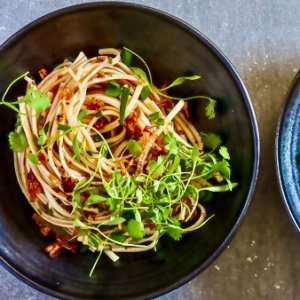
 1
1




















